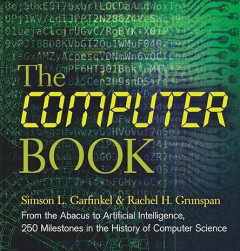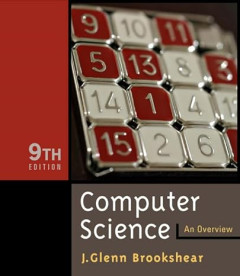Ditapis dengan
E-book Data Power : Radical Geographies of Control and Resistance
One step after another, each recorded and located by the Global Position-ing System (GPS) and shared with the world. Sequential steps repeated daily in our morning run or commute become part of an economic cycle of digital tracking, extracting our location data and serving parts back to us as directions, as ads, as insurance rates. And also as egregious privacy violations which set …
- Edisi
- -
- ISBN/ISSN
- 9781786805560
- Deskripsi Fisik
- 177 hlm
- Judul Seri
- -
- No. Panggil
- 004 THA d

E-book The Computer Book: From the Abacus to Artificial Intelligence, 250 Mil…
With 250 illustrated landmark inventions, publications, and events—encompassing everything from ancient record-keeping devices to the latest computing technologies—this highly topical addition to the Sterling Milestones series takes a chronological journey through the history and future of computer science. Two expert authors, with decades’ of experience working in computer research and i…
- Edisi
- -
- ISBN/ISSN
- 9781454926221
- Deskripsi Fisik
- 586 halaman, ilus.
- Judul Seri
- -
- No. Panggil
- 004.03 GAR t
E-book Altmetrics for Digital Libraries : Concepts, Applications, Evaluation,…
The continuing adoption of technology (i.e., computers, cell phones,and information systems) and the associated large-scale growth of information haveled to the “big data” movement (Diebold, 2012; Mayer-Schönberger & Cukier, 2013), where “big data” refers to the large volume of information that no longer fits in the memory that modern computers use for process…
- Edisi
- -
- ISBN/ISSN
- 9783832553098
- Deskripsi Fisik
- 292 hlm
- Judul Seri
- -
- No. Panggil
- 004.071 NUR a
E-book Enhanced Living Environments : Algorithms, Architectures, Platforms, a…
Enhanced and Assisted living environments (ELE/ALE) have been in focus ofthe researches for more than decade [8]. Adaptation of novel technologies inhealthcare has taken a slow but steady pace, from the first wearable sensors forchronic disease conditions and activity detection with offline processing towardsimplantable or non-invasive sensors supported by advanced data analytics forpervasive a…
- Edisi
- -
- ISBN/ISSN
- 9783030107529
- Deskripsi Fisik
- 339 hlm
- Judul Seri
- -
- No. Panggil
- 004.071 ACH e
E-book Diversity in Computer Science : Design Artefacts for Equity and Inclusion
ll the research we present in this book took place in the Department of Computer Science at the University of Copenhagen (Datalogisk Institut Københavns Universitet [DIKU]), in Denmark. Thus, our work is situated in Denmark, and since gender is culturally shaped (Butler 1999), providing some contextual information about the Computer Science Department is important. The Univer…
- Edisi
- -
- ISBN/ISSN
- 9783031133145
- Deskripsi Fisik
- 139 hlm
- Judul Seri
- -
- No. Panggil
- 004 BJO d

E-book The Nature of Physical Computation
Computing systems are everywhere today. Even the brain is thought to be a sort of computing system. But what does it mean to say that a given organ or system computes? What is it about laptops, smartphones, and nervous systems that they are deemed to compute, and why does it seldom occur to us to describe stomachs, hurricanes, rocks, or chairs that way? The book provides an extended argument fo…
- Edisi
- -
- ISBN/ISSN
- 9780197552384
- Deskripsi Fisik
- 319 halaman
- Judul Seri
- -
- No. Panggil
- 004 SHA t

E-Book Computer Science: An Overview (9th Edition)
In its ninth edition, this book continues to provide a comprehensive, accessible, and up-to-date introduction to the dynamic field of computer science using a breadth-first approach. This book presents an introductory survey of computer science. It explores the breadth of the subject while including enough depth to convey an honest appreciation for the topics involved. The new edition includes …
- Edisi
- -
- ISBN/ISSN
- 0321387015
- Deskripsi Fisik
- 616 halaman
- Judul Seri
- -
- No. Panggil
- 004 BRO c
E-book Dictionary of Computer and Internet Terms
This dictionary contains over 32,000 terms that are specific to Computers and the Internet. Each term includes a definition / description. With more than 750 pages, this dictionary is one of the most comprehensive resources available. Terms relate to applications, commands, functions, operating systems, image processing and networking. No other dictionary of computing terms even comes close to…
- Edisi
- Vol. 1
- ISBN/ISSN
- -
- Deskripsi Fisik
- 1471 hlm
- Judul Seri
- -
- No. Panggil
- 004.03 RIG d

Neuro Fuzzy and Soft Computing
Soft computing is an innovative approach to constructing computationally intelligent systems, has just come into the limelight. Its now realized that complex real world problems require intelligent systems that combine knowledge, techniques, and methodologies from various sources.
- Edisi
- -
- ISBN/ISSN
- 0132874679
- Deskripsi Fisik
- xxvi; 604 hal; 18 x 24 cm
- Judul Seri
- -
- No. Panggil
- 006.3 JSR n
 Karya Umum
Karya Umum  Filsafat
Filsafat  Agama
Agama  Ilmu-ilmu Sosial
Ilmu-ilmu Sosial  Bahasa
Bahasa  Ilmu-ilmu Murni
Ilmu-ilmu Murni  Ilmu-ilmu Terapan
Ilmu-ilmu Terapan  Kesenian, Hiburan, dan Olahraga
Kesenian, Hiburan, dan Olahraga  Kesusastraan
Kesusastraan  Geografi dan Sejarah
Geografi dan Sejarah